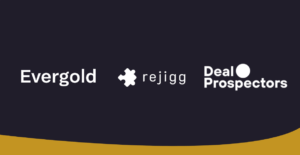I’ve been under LOI 3x on small businesses listed by brokers in 2025, thanks mostly to tools that aggregate on-market SMB listings.
But brokered deals are competitive. By nature of being promoted publicly, they tend to garner a ton of qualified buyers. This leads many searchers to pursue proprietary outreach instead or in parallel.
But reaching out cold can be inefficient if you don’t have a well-defined target business in mind. Where do you even start? Enter the world of off-market platforms: a middle ground between brokered deals and cold outbound.
While it sounds like an oxy-moron, off-market deal platforms showcase businesses that aren’t technically for sale yet. Typically sourced through private networks or proprietary outreach, owners of these off-market businesses have expressed interest in *potentially* selling, but haven’t committed to hiring a broker, gathering detailed financial data, and creating a comprehensive CIM. For searchers and investors, such opportunities often mean less competition, more direct access to sellers, and the potential for more favorable terms.
Whether you’re running a search fund, looking for a bolt-on, or just starting your self-funded ETA journey, you may want to give “off market” deal platforms a shot. I’ve tried several for the last 6 months with mixed results. Each offers a unique approach — from cold outreach teams and private matchmaking to curated deal rooms and automated sourcing tools. Who they charge (buyer or seller) and how they engage SMBs owners dictates the quality, volume, size, and overall readiness to transact. Below is my honest take on the major players.
Off-Market / Self-Listed Deal Flow Platforms — Quick Comparison
Searchers looking to connect with buyer-listed businesses through a vetted marketplace — and only pay for success
Read full review
I’ve personally had 20+ conversations with sellers through Rejigg so far, and what stands out is how engaged most are. Candidly, that’s not something you always find on off-market platforms. Many owners here seem warmed up and genuinely open to an exit, which makes your time invested more likely to yield results. That said, many owners don’t respond to my outreach via the platform as well. A mixed bag to be sure.
Rejigg sources its deals through proprietary email and cold-calling, so the flow feels fresh and active. Deals vary in size, but I’ve evaluated several above $1M EBITDA — not just the smaller businesses typical of “off-market” or self-listed platforms.
The flip side is that Rejigg is fairly well known among searchers at this point, which spells more buyer competition, especially for strong recurring cash-flow businesses. Still, for me, Rejigg has been one of the few platforms that’s yielded real conversations with serious sellers.
Pros
- Many sellers are actively looking to exit, not just testing the waters
- Mix of larger and smaller deals, including $1M+ EBITDA businesses
- Proprietary sourcing (email + cold calling) keeps deal flow fresh
- Easy to message and scheduling tools to connect directly with sellers
Cons
- Higher competition from other buyers for attractive deals.
- Requires active outreach and follow-up — not a passive listing site
- Financial data availability varies between deals.
- Buyers pay a success fee (Lehman scale)
Buyers seeking smaller businesses (typically <$1m SDE) with near zero competition
Read full review
I signed up for Deal Prospectors with the intention of finding businesses before they hit the market. What I found is just that – a unique opportunity to connect with owners who are ready to sell, often for low multiples, and with minimal competition.
The one caveat: its deal sizes are on the smaller end, rather than the coveted $1m+ EBITDA “sweet spot”. And there are far fewer deals available than on other platforms. This may be because they source deals via ads on Facebook and linkedin, rather than more targeted outbound.
But the unique appeal is zero competition. DealProspector listings seem unexposed, and thus the potential to negotiate with sellers is high. That said, because deal volume and size are smaller, you may outgrow the platform or find fewer fits for your criteria.
If your search is geographically constrained, you can work with DealProspectors directly (for a fee) to point their deal-flow machine directly at your target market.
Pros
- Near zero competition relative to other platforms
- Access owners who are ready to sell and willing to negotiate favorable terms
- Mostly charge for success, low monthly pricing
Cons
- Very few larger deals (>$1m EBITDA)
- Quality, financial transparency varies and requires vetting
- As with most platforms: sellers have varying levels of sophistication
Searchers who are looking for higher-quality off-market opportunities (including businesses not actively listed for sale) that have varying levels of eagerness to sell.
Read full review
When I explored Baton, what immediately stood out was its focus on what they call Off-Market Profiles — businesses whose owners aren’t formally for sale yet but who requested a “free business evaluation” and are open to being approached. For me this was appealing because it opens up a larger pool of potential targets. Such businesses haven’t been broadly marketed, so the competition may be lower than brokered listings.
That said, my experience with the platform has been a mix of promising features and some disappointment. On the positive side, Baton presents high-level financials for many of these off-market profiles and allows a buyer to “express interest” to signal serious intent, which can help when dealing with owners who are ambivalent about selling.
On the other hand, the conversion rate from profile to actual deal is modest. Many “private” (AKA off-market) listings sit without active seller engagement. Even after sending personalized messages explaining my enthusiasm and fit, and even making an initial offer, most sellers didn’t respond. So while Baton has great promise for off-market sourcing, I found it requires patience and proactive buyer activity to turn interest into an actual transaction.
Pros
- Access to business owners aren’t actively marketing, offering an opportunity before their proper sales processes.
- High-level financial information available upfront for most profiles
- Seamless suite of tools for messaging, NDA + LOI submission, and follow up
- Generally higher-quality (and somewhat larger) deals compared to similar platforms
Cons
- Many listings are “owner-curious” rather than seller-committed, so you may hear crickets despite multiple attempts to engage sellers
- The process tends to require more active work on your side (profile completeness, outreach, informal offers) rather than purely passive browsing.
- Some user feedback reports issues with usability, transparency around “under contract” status, or listings disappearing.
- As with any higher-quality off-market platform, you may still face competition or need to move decisively when you find a good fit.
Buyers (or advisors) focused on higher-quality, lower-middle market deals who are comfortable paying for a curated, off-market network with less noise.
Read full review
I’ve spent time looking through PrivSource and what stood out most is how it positions itself as a premium, curated platform rather than a broad listing site. PrivSource combines a private M&A deal network with AI-powered buyer/discovery tools, aimed at the lower-middle market.
In my view, if you meet the criteria (serious buyer, sufficient capital, clear acquisition thesis), the higher upfront subscription costs likely gives you access to “off market” deals that are less exposed, better vetted, and closer to a transaction.
That said, the higher subscription or entry cost eats into your search runway and attracts more sophisticated buyers. There are also fewer deals to sort through than on other platforms. Thus, Privsource’s “off-market” distinction doesn’t always mean less competition.
Overall, for me PrivSource functions as a more “serious deal-room” approach rather than a broad marketplace, which aligns well if your target is quality over quantity. I have too much deal flow currently (or perhaps just too cheap) to pay the high monthly fee, but I can definitely see the appeal for folks searching on the side or who want to pay to accelerate their process.
Pros
- Less noise + higher-quality “off-market” deals than most other platforms
- No success fee which could be less expensive in the long-run if you close fast
- Advanced tools (AI buyer lists, strategic match-making) to help you move fast
Cons
- Higher upfront (monthly) subscription cost than most other platforms
- Lower volume — fewer deals overall means you may need to be patient
- Even though it’s off-market, you still may face competition from other serious acquirers
- As always, “off-market” does not guarantee exclusivity
Buyers looking for modest-sized businesses and are comfortable engaging in a platform that mixes publicly-listed with off-market leads
Read full review
I first tried BizScout to explore how well it supports off-market deal sourcing. On one hand, it offers a standard marketplace of brokered business listings; on the other, it offers tools to help searchers source off-market, less-exposed opportunities.
To be honest, I haven’t tried their premium “Off-market lead generation platform” for $59 / month. If I do, I’ll circle back to update this post.
But having used their platform to browse listings, there are many trade-offs. While BizScout offers access to off-market-ish deals, the volume of “owner-not-for-sale-yet” opportunities seemed super limited. Once I used filters to drill down on my target market + criteria, there weren’t any available.
Pros
- Low-cost (including free tier) so you can test functionality without investing a ton upfront
Cons
- It doesn’t always feel as deep in pure off-market sourcing; you may see more “lightly listed” deals rather than true dark-market opportunities.
- Very few larger deal sizes (e.g., >$1m EBITDA)
- Zero available deals after filtering (may just be for my criteria)
Buyers who want vetted listings, streamlined process and access to serious deal flow — especially if you’re comfortable with a more structured platform and are looking for higher-quality opportunities.
Read full review
Openfair’s listings are better presented with cleaner data than others. All listings are vetted, and financials are accessible (with the correct non-disclosure protocols). And according to their site, the platform has yielded over $500 million in business transactions already.
On the flip side, I found a few caveats worth noting. First, the actual availability of truly off-market deals is spotty. Sellers pay a hefty fee to list on the platform, which indicates sellers are ready to exit. Many businesses are therefore cross-listed elsewhere and exposed to many buyers. Second, for some regions the listings access is limited, indicating a lower volume of available deals in general.
Overall, if you’re seeking a streamlined platform with higher quality listing presentation, Openfair is free for buyers and therefore worth adding to your toolkit.
Pros
- Listings are well-structured and vetted, which saves time on initial screening.
- Sellers pay to self-list on the platform, which means they are likely committed to selling
Cons
- The “off-market” element (i.e., owners not broadly marketing) is less clear and competition may still be meaningful.
- Somewhat more limited deal volume than other platforms
- Even though listings look polished, you still must perform full due diligence — the platform doesn’t eliminate that.
Concluding Thoughts
After testing so many major “off-market” deal flow platforms, one thing has become clear: no single site offers you everything. Each has its own strengths, and ideal use case — and success largely depends on how actively you engage with the process.
If you’re looking for serious, motivated sellers and are ready to jump into direct conversations, Rejigg has been my most productive source by far. For smaller, low-competition opportunities, DealProspector quietly wins by focusing on under-the-radar businesses. Baton shines when you’re patient enough to nurture “curious” owners who might not yet have committed to selling, while PrivSource feels built for buyers who don’t mind paying a premium for higher-quality deals.
In the end, the real advantage of off-market platforms isn’t the software — it’s the access. These sites give searchers a chance to reach sellers directly who don’t want to sell with a broker. Thus, this offers more space to negotiate on your own terms, but also requires work to convince owners it’s time to sell. Whether you’re a search fund, independent sponsor, or self-funded buyer, the best approach is to use multiple platforms, stay consistent with outreach and be patient. Many “off market” sellers aren’t ready to exit the first time you chat with them, but warm to the idea as time passes. I’ve had many resurface after months of radio silence.















